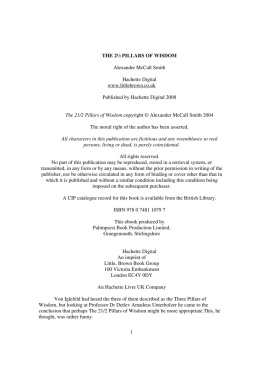This book is fo r Jean Deniso n an d Richard Deniso n
CHAPTER TEN
THE CLERKS TAL E
M MA RAMOTSWE realised that something would have to be done about the No. 1 Ladies Detective Agency. It did not take long to move the contents of the old ofce to the new quarters at the back of Tlokweng Road Speedy Motors; there was not much more than one ling cabinet and its contents, a few metal trays in which papers awaiting ling could be placed, the old teapot and its two chipped mugs, and of course the old typewriterwhich had been given to her by Mr J.L.B. Matekoni and was now going home. These were manhandled into the back of the tiny white van by the two apprentices, after only the most token complaint that this was not part of their job. It would appear that they would do anything requested of them by Mma Makutsi, who had only to whistle from the ofce to nd one of them running in to nd out what she needed.
This compliance was a surprise to Mma Ramotswe, and she wondered what it was that Mma Makutsi had over these two young men. Mma Makutsi was not beautiful in a conventional sense. Her skin was too dark for modern tastes, thought Mma Ramotswe, and the lightening cream that she used had left patches. Then there was her hair, which was often braided, but braided in a very strange way. And then there were her glasses, of course, with their large lenses that would have served the needs of at least two people, in Mma Ramotswes view. Yet here was this person who would never have got into round one of a beauty competition, commanding the slavish attentions of these two notoriously difcult young men. It was very puzzling.
It could be, of course, that there was something more than mere physical appearance behind this. Mma Makutsi may not have been a great beauty, but she certainly had a powerful per sonality, and perhaps these boys recognised that. Beauty queens were often devoid of character, and men must surely tire of that after a while. Those dreadful competitions which they heldthe Miss Lovers Special Time Competition or the Miss Cattle Industry Competition brought to the fore the most vacuous of girls. These vacuous girls then attempted to pronounce on all sorts of issues, and to Mma Ramotswes utter incomprehension, they were often listened to.
She knew that these young men followed the beauty com petitions, for she had heard them talking about them. But now their main concern seemed to be to impress Mma Makutsi, and to atter her. One had even attempted to kiss her, and had been pushed away with amused indignation.
Since when does a mechanic kiss the manager? asked Mma Makutsi. Get back to work before I beat your useless bottom with a big stick.
The apprentices had made short work of the move, loading the entire contents within half an hour. Then, with the two young men travelling in the back to hold the ling cabinet in place, the No. 1 Ladies Detective Agency, complete with painted sign, made its way to its new premises. It was a sad moment, and both Mma Ramotswe and Mma Makutsi were close to tears as they locked the front door for the last time.
It is just a move, Mma, said Mma Makutsi, in an attempt to comfort her employer. It is not as if we are going out of business.
I know, said Mma Ramotswe, looking, for the last time perhaps, at the view from the front of the building, over the rooftops of the town and the tops of the thorn trees. I have been very happy here.
We are still in business. Yes, but only just. Over the last few days, with all the turmoil and the lists, Mma Ramotswe had devoted very little time to the affairs of the agency. In fact, she had devoted no time at all, when she came to think about it. There was only one outstanding case, and nothing else had come in, although it undoubtedly would. She would be able to charge the Government Man a proper fee for her time, but that would depend on a successful outcome. She could send him an account even if she found nothing, but she always felt embarrassed asking for payment when she was unable to help the client. Perhaps she would just have to steel herself to do this in the Government Mans case, as he was a wealthy man and could well afford to pay. It must be very easy, she thought, to have a detective agency that catered only to the needs of rich people, the No. 1 Rich Persons Detective Agency, as the charging of fees would always be painless. But that was not what her business was, and she was not sure that she would be happy with that. Mma Ramotswe liked to help everybody, no matter what their station was in life. She had often been out of pocket on a case, simply because she could not refuse to help a person in need. This is what I am called to do, she said to herself. I must help whomsoever asks for my help. That is my duty: to help other people with the problems in their lives. Not that you could do everything. Africa was full of people in need of help and there had to be a limit. You simply could not help everybody; but you could at least help those who came into your life. That principle allowed you to deal with the suffering you saw. That was your suffering. Other people would have to deal with the suffering that they, in their turn, came across.
BUT WHAT to do, here and now, with the problems of the busi ness? Mma Ramotswe decided that she would have to revise her list and put the Government Mans case at the top. This meant that she should start making enquiries immediately, and where better to start than with the suspect wifes father? There were several reasons for this, the most important being that if there really were a plot to dispose of the Government Mans brother, then this would probably not be the wifes idea, but would have been dreamed up by the father. Mma Ramotswe was convinced that people who got up to really serious mischief very rarely acted entirely on their own initiative. There was usually somebody else involved, somebody who would stand to benet in some way, or somebody close to the perpetrator of the deed who was brought in for moral support. In this case, the most likely person would be the wifes father. If, as the Government Man had implied, this man was aware of the social betterment which the marriage entailed, and made much of it, then he was likely to be socially ambitious himself. And in that case, it would be highly convenient for him to have the son-in-law out of the way, so that he could, through his daughter, lay hands on a substantial part of the family assets. Indeed, the more Mma Ramotswe thought about it, the more likely it seemed that the poisoning attempt was the clerks idea.
She could imagine his thoughts, as he sat at his small gov ernment desk and reected on the power and authority which he saw all about him and of which he had only such a small part. How galling it must be for a man of this stripe to see the Government Man drive past him in his ofcial car; the Gov ernment Man who was, in fact, the brother-in-law of his own daughter. How difcult it must be for him not to have the recognition that he undoubtedly felt that he would get if only more people knew that he was connected in such a way with such a family. If the money and the cattle came to himor to his daughter, which amounted to the same thingthen he would be able to give up his demeaning post in the civil serv ice and pursue the life of a rich farmer; he, who now had no cattle, would have cattle aplenty. He, who now had to scrimp and save in order to afford a trip up to Francistown each year, would be able to eat meat every day and drink Lion Lager with his friends on Friday evenings, generously buying rounds for all. And all that stood between him and all this was one small, beating heart. If that heart could be silenced, then his entire life would be transformed.
The Government Man had given Mma Ramotswe the wifes family name and had told her that the father liked to spend his lunch hour sitting under a tree outside the Ministry. This gave her all the information she needed to nd him: his name and his tree.









